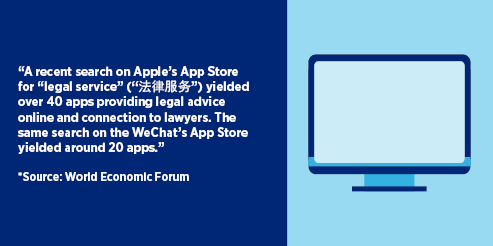The Inside Story of Legal in China
Data privacy and lawtech –– otherwise known as a technology that aims replaces traditional legal services –– continue to be the main areas within Mainland China that are shaping the world of legal professionals within the country. The demand for legal professionals is at an all-time high, yet at the same time, employers are increasingly demanding of their legal teams to possess specialised skills required in the aforementioned niche areas.
PROLIFERATION OF NEW LAWS TO ADDRESS THE MISUSE OF PRIVACY DATA RESULTS IN DEMAND FOR NICHE LEGAL PROFESSIONALS
With the global increase of data held online and within the cloud, the protection of personal information should be at the forefront of everyone’s mind. However, Mainland China’s population lives so much of its life online, through the usage of mobile phone applications and digital platforms. Chinese citizens, for the most part, been indifferent with the possibility of their privacy being violated as long as their convenience is not impeded. Fortunately for them, the government is escalating its vigilance on behalf of its citizens.
One new development that is resulting in a fundamental shift in legal talent needs is the new draft rules for data privacy protection. Such a measure is in response to the increase in cybercrimes in the country, such as the new waves of data breaches, leading to a proliferation of new laws to address the misuse of privacy data. According to Technode, “31% of around 1,300 apps were reported by Chinese netizens for collecting data without specific consent, while another 20% allegedly gathered information irrelevant to their businesses”.

LAWTECH BECOMES A NORM IN MAINLAND CHINA; TECH-SAVVY LAWYERS ARE IMPORTANT ASSETS IN APPLICATION DEVELOPMENT PROJECTS
While the issue of data protection is a primary concern for Mainland China’s legal industry today, another technological advancement is causing the potential for a disruptive future, as the seemingly unstoppable momentum of Artificial Intelligence (AI) gathers pace.
Dubbed as a legal trailblazer, Mainland China has seen rapid technological advancements within lawtech’ in the country’s endeavour to provide affordable legal services. As a result, the R&D funds being supplied by the likes of the CAIIIA will see the roles of junior lawyers diminish, but this is still expected to that things will remain the same for the next few years.
As a gauge of the progress of lawtech, according to the World Economic Forum, “A recent search on Apple’s App Store for “legal service” (“法律服务”) yielded over 40 apps providing legal advice online and connection to lawyers. The same search on the WeChat’s App Store yielded around 20 apps.”
In endeavours to develop such mobile applications, experienced legal professionals are required to give counsel on the content within these technologies. Talent with strong legal expertise, with a blend of tech-savviness, will definitely be assets to teams working on lawtech projects. Lawyers who have yet to venture into the world of tech could benefit from upskilling, should they yearn to get a piece of the lawtech pie.

Aside from the effects of technology on the world of work for legal professionals, the industry is seeing an increasing need for specialist skills in legal practices such as employment, litigation and compliance.
In general, employers prefer candidates with relevant industry background in specific areas (such as Life Sciences, Entertainments, etc). Law firms also saw a stable amount of hiring needs, especially within the areas of M&A and General Commercial.
To become competitive within a talent shortage market, hiring processes must be robust, adaptable and most important, efficient. It is also worth noting that while the upper echelons of the organisations are facing relatively slower movement of legal talent, the market for entry-to-middle level candidates is thriving. Such talent are receiving multiple offers and it is a race to present your offer to them first and ensure it aligns with their career development and expectations.
Whether candidates work for Chinese (local) or international companies, the market for 2019 looks positive with consistent growth. For talent wanting to make a move in the sought-after sectors of compliance, M&A and commercial, they can look forward to a promising 12 months, as long as they keep abreast of any disruptive technology likely to come their way.
If you would like to discuss this report in more depth or you wish to discuss your recruitment needs, please email: Lena.xue@hays.cn
Hays research
Hays Workforce Trends In 2024: Accountancy and Finance
China’s Technology Talent Trends for 2024
DNA series
